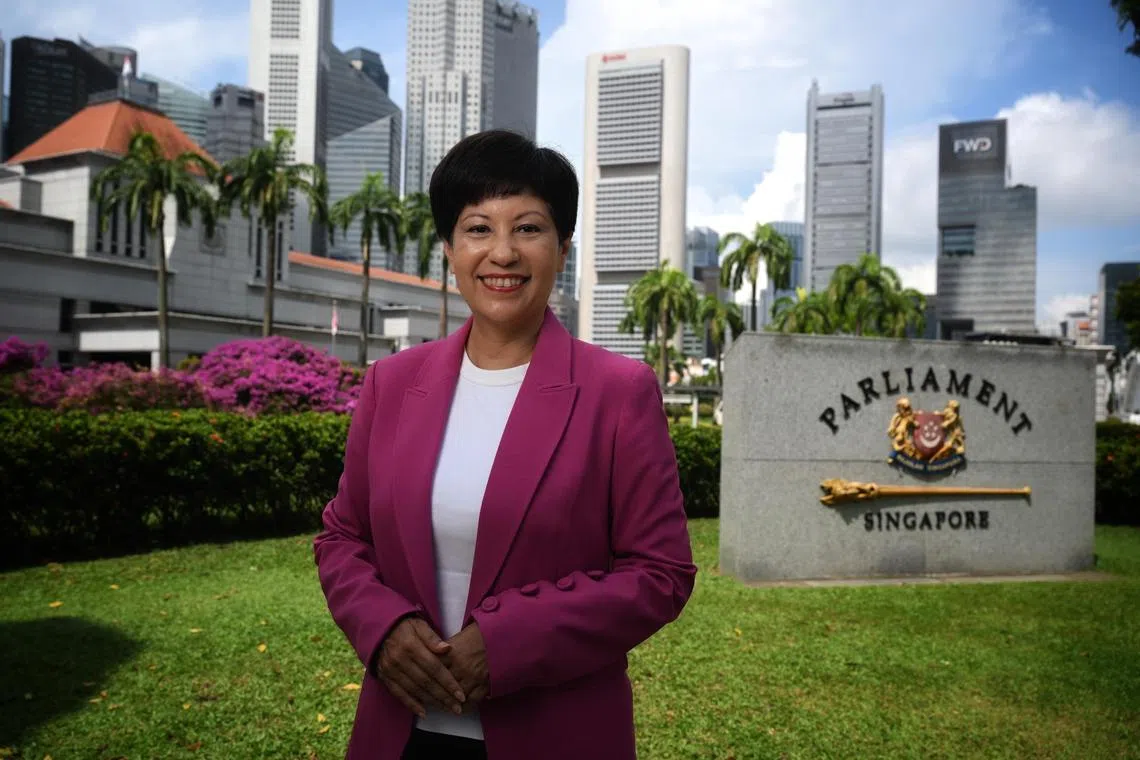Sequencing and standards: Indranee on role of Leader of the House
Sign up now: Get ST's newsletters delivered to your inbox

Outlining her priorities for her second term as Leader of the House, Ms Indranee Rajah said it continues to be about upholding the quality of debate in the House.
ST PHOTO: CHONG JUN LIANG
SINGAPORE – The role of the Leader of the House in maintaining order and upholding parliamentary privilege might have come to the fore in the previous term of Parliament, but to Ms Indranee Rajah a good part of the job can be distilled into one word: sequencing.
This is as proper sequencing – whether of parliamentary questions (PQs), Bills, or motions – is crucial to the work of Parliament, which in a nutshell is about public accountability, she said in an interview with The Straits Times on July 4.
Prime Minister Lawrence Wong announced on June 20 that he had designated Ms Indranee as Leader of the House
This means Ms Indranee will be in her second term as Leader when the 15th Parliament convenes for its first sitting on Sept 5
Ms Indranee noted that events may occur which spark public concern and require an urgent explanation from the authorities the next time Parliament is in session.
Parliament typically sits once a month, for two or three days.
Given that the first 90 minutes of each sitting are reserved for answering PQs and there may be close to 100 such questions filed by MPs, more pressing questions have to be prioritised, so that ministers can answer them and MPs can seek further clarifications, said Ms Indranee, who is Minister in the Prime Minister’s Office.
The same is true for Parliament’s legislative function of deciding policies and making law, where the Leader’s role is to determine which Bills should be debated and passed ahead of others, she added.
“Prioritising is a key thing (as Leader) because it enables the public to understand issues that may be on the public’s mind,” she said.
“If it’s a Bill, prioritising makes sure that a policy gets done by a certain deadline so that the policy can take effect.”
On how her role differs from that of the PAP party whip, Senior Minister of State for Sustainability and the Environment and Education Janil Puthucheary, Ms Indranee noted that the whip deals with party matters such as discipline and which MPs are intending to speak on each day.
Meanwhile, the Leader coordinates between government ministries and the House on the scheduling of parliamentary business.
While she proposes the first cut of Parliament’s agenda, Ms Indranee noted that the Speaker makes the final call, and has discretion to change the sequencing.
The aim is to make sure Parliament’s work is well-fitted and can be completed in the allotted number of days, said Ms Indranee, who is also Second Minister for Finance and for National Development.
“You don’t want to end super early one day, and then make everybody stay back past midnight the next day,” she said, while noting that her role is to extend the sitting time as needed.
“It doesn’t always work out that way, but we try our best.”
During the 14th Parliament, Ms Indranee’s role as Leader attracted public attention, as it fell to her to file a formal complaint against former Workers’ Party MP Raeesah Khan for lying to the House
On multiple occasions, she also rebuked Progress Singapore Party’s Mr Leong Mun Wai, including for failing to substantiate certain allegations and for his comments outside the Chamber on parliamentary proceedings.
Ms Indranee noted that while the Speaker makes the final decision on whether or not an MP’s behaviour has contravened the rules, somebody has to raise the issue in order for him to do so.
Where there is a need, it is important for the Leader to intervene, she added.
“When there is no need, and everything is going along swimmingly as it should, then there’s no reason for me to insert myself into the process,” she added.
Sometimes, mistakes are made unintentionally but must still be dealt with in the public eye, so that the rules are observed and Parliament continues to run smoothly, she said.
Being an MP is a privilege, and the law confers certain immunities on MPs so they can speak freely in Parliament without being prosecuted or sued for their statements.
But such privilege has to be exercised responsibly, Ms Indranee stressed.
“It is very important not to mislead, not to lie in Parliament, that what you say can be substantiated,” she said. “And if that is not followed, then it is necessary to call that into question and have that dealt with.”
Outlining her priorities for her second term as Leader, Ms Indranee said it continues to be about upholding the quality of debate in the House, such that Parliament’s work is efficient, substantive and impactful, and conducted with decorum and propriety.
This requires MPs to identify issues clearly and crystallise what is at stake and the implications of the outcome of a Bill or a motion, she added.
“Good, substantive debate does not always make good theatre, and I think we have to be mindful of that,” she said.
“We have to keep our eyes firmly on the substance, and make sure that we are addressing the things that are of importance to Singaporeans, and how we can take Singapore forward.”



